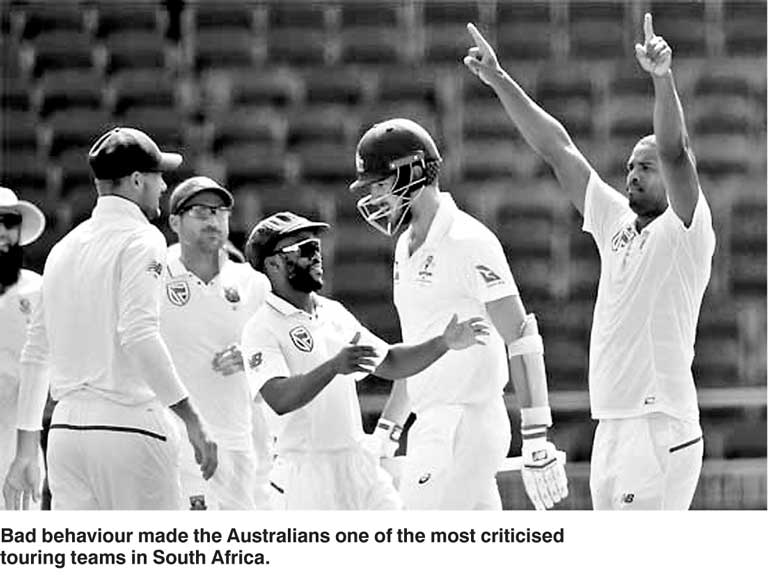Sunday Feb 22, 2026
Sunday Feb 22, 2026
Saturday, 7 April 2018 00:00 - - {{hitsCtrl.values.hits}}

Johannesburg (AFP): The cold numbers tell a convincing story of South African superiority in their 3-1 Test series win over Australia.
What will not be reflected in the scorecards are the controversial incidents that led to Cricket Australia and new captain Tim Paine reassessing the way the country plays cricket.
It was sparked by the now infamous ball-tampering controversy in Cape Town which saw skipper Steve Smith, Vice-captain David Warner and young batsman Cameron Bancroft sent home in disgrace and banned. Australia won the first Test, primarily because South Africa collapsed in the first innings to a superb exhibition of fast reverse swing bowling by Mitchell Starc.
After that, South Africa dominated the series with convincing victory margins of six wickets, 322 runs and 492 runs in the remaining three Tests.
In a contest between probably the two best fast bowling attacks in the world, South Africa’s batsmen provided a crucial difference.
They made five centuries and 12 half-centuries, while Australia could muster only ten half-centuries without a single hundred.
South Africa had the three leading run-scorers in the series in Aiden Markram (480), AB de Villiers (427) and Dean Elgar (333).
Starc struggled with an injury after the first Test and his performances fell away to the extent that he did not play in the final Test.
Pat Cummins, who was Australia’s outstanding player during the series, took 22 wickets at an average of 21.45 but none of the other Australian bowlers had averages below 30.
South Africa’s three leading fast bowlers, man of the series Kagiso Rabada (23 wickets), Vernon Philander (16) and Morne Morkel (15) all took their wickets at a cost of less than 20 apiece.
A combination of bad behaviour and poor public relations made the Australians one of the most criticised touring teams in South Africa. Warner was a central figure even before the ball tampering scandal. Warner’s excessive celebration of the run-out of De Villiers in Durban, which was followed by prolonged “verbals” against surviving batsman Markram and later of Quinton de Kock, resulted in the staircase confrontation which led to Warner and De Kock being fined.
Warner said De Kock had made “vile and disgusting” comments about his wife, Candice.
Australian coach Darren Lehmann described the behaviour of spectators in Cape Town as “disgraceful”, which led to ridicule from former players of other countries who had been the target of abuse from Australian crowds down the years.
‘Handshakes’
Paine provided a refreshing change following his appointment, speaking candidly about the need for Australia to temper their aggressive approach and initiating a public exchange of handshakes between the teams before the fourth Test.
“We have found out in the last month that the Australian public don’t like the way we go about it, so we have to improve our behaviour,” he admitted.
With Lehmann announcing his resignation effective after the fourth Test, there will be a significant changing of the guard in the Australian team with Smith and the abrasive Warner banned for 12 months.
Some, such as spin bowling legend Shane Warne, believe the changes should not stop on the playing field.
Chief executive James Sutherland and performance manager Pat Howard are both under pressure.
Paine identified the key challenge for Australia as they strive to bounce back from a cricket and public relations mauling.
“We’ve got to find a fine line between being really respectful of the opposition and also being at a level that is really competitive,” he said.
South Africa have a break until a two-Test tour of Sri Lanka in July.
They will be without fast bowler Morne Morkel, who has retired from international cricket, but have a ready-made replacement in Lungi Ngidi, while veteran Dale Steyn is hoping to come back to international cricket after two years of injury frustrations.
Although some of South Africa’s senior players, such as De Villiers, Hashim Amla and Steyn, may be in the twilight of their careers, the country has two of the world’s outstanding young cricketers in opening batsman Markram and fast bowler Rabada.
South Africa played ten Tests during the home summer, winning eight and losing two, with series wins against India and Australia the highlights.
Markram made exactly 1000 runs at an average of 55.55 in his debut season, while Rabada took 56 wickets at an average of 16.98.
Remarkably, South Africa took all 20 wickets in each of the ten Tests.